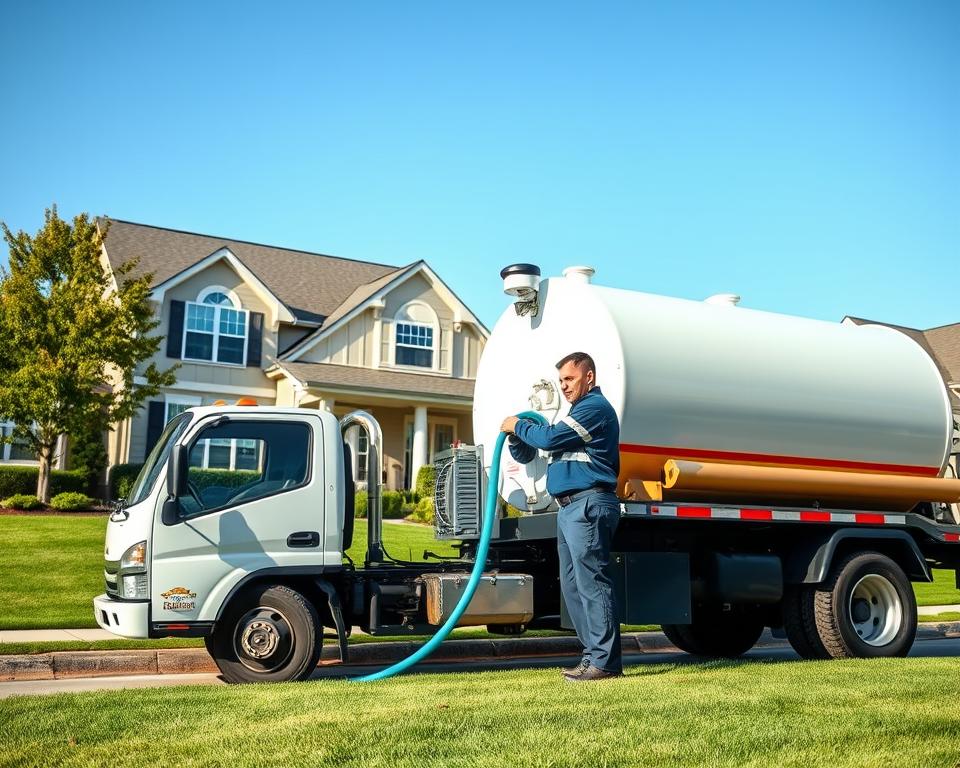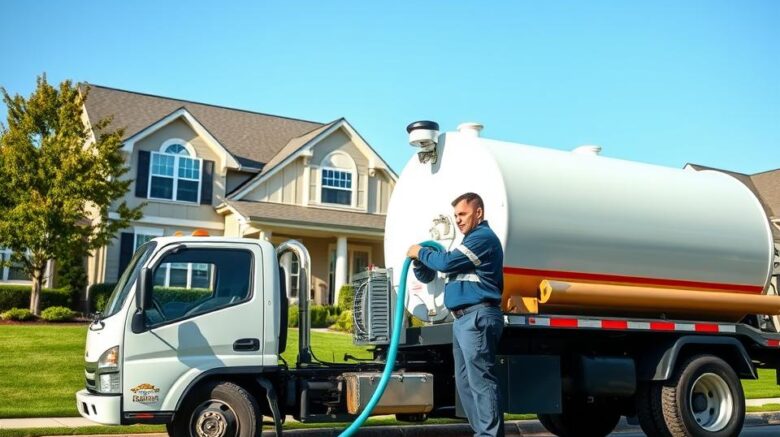Cleaning a Septic System: Protect Your Tank Health
Do you ever wondered about the ramifications of overlooking septic system upkeep? For those who use these units for wastewater treatment, missing scheduled care can result in significant expenses. It also poses risks to both well‑being and the environment. Servicing your septic system is more than a quick task; it’s crucial for making sure your household runs smoothly. By consistently clearing out your septic tank, you prevent solid waste collection and extend the lifespan of your unit. This preventive approach helps you sidestep any unwanted events. Discover the significance of septic tank upkeep and the methods required with septic tank cleaning services near me.
Core Messages
- Scheduled septic system pumping is vital for avoiding expensive fixes.
- Ignoring upkeep can result in health risks for your loved ones.
- Knowing your septic system aids in proper stewardship.
- Symptoms of a failing septic system should be noticed quickly.
- Professional services can help in maintaining peak tank health.
Grasping Your Septic System
A septic system is an efficient in‑situ solution for treating wastewater. It mainly comprises two sections: the septic tank and the leachfield. Both are integral for providing proper sanitation and protecting the surroundings.
The septic tank collects wastewater from your home. There, waste solids sink to the base, and effluent drift to the top. Bacteria within the tank decompose the organics, making the effluent simpler to handle. This partially treated wastewater then flows to the leachfield for further purification by the ground, concluding the treatment.
It’s vital for homeowners to appreciate the mechanics of their septic system. Grasping how the septic tank and leachfield work as a unit can lead to enhanced system care. This understanding promotes proper maintenance methods, ensuring the system’s robustness.

Value of Consistent Septic System Cleaning
Routine cleaning of the septic system is crucial for home and public health. If neglected, unprocessed wastewater can seep into your yard. This escape can cause subsurface water contamination, creating dangerous conditions. By keeping the septic system clean, you protect your family and the ecosystem.
It’s recommended to service the septic system every three to five years, based on how much you load it. Such maintenance is not just eco‑friendly; it prevents expensive repairs. A septic system that’s regularly serviced functions more reliably, providing a healthier living space and a cleaner ecosystem.
Warnings Your Septic Tank Needs Attention
Homeowners need to recognize signs that their septic tank may need pumping. Common indicators to monitor are:
- Sluggish draining in sinks, showers, and lavatories
- Bad smells near the absorption area
- Effluent returns in indoor pipes
- Prolonged damp zones or extra‑green areas of grass on top of the septic system
It’s essential to recognize these signs quickly to avoid major septic tank failures. Scheduled inspections are key. They find issues before they turn into costly fixes. Inspecting your system consistently confirms it operates well and survives longer.
Keeping watch and responding quickly are essential for septic system care. By paying close attention to these warning signs, you can keep your septic system in optimal health.
Septic System Pumping Intervals
Cleaning your septic system regularly is central to keeping your home’s plumbing in good order. Experts typically recommend servicing the septic tank every three to five years. However, this can change according to the size of your family, how much water you use, and the capacity of your tank.
If you have a larger household that draws more water, you could need to service the system at shorter intervals. Tracking your water consumption can let you determine if you need to adjust your service schedule.
All in Sanitation advises setting up a steady pumping schedule that suits your household’s particular needs. Following a routine maintenance program keeps your septic system functioning efficiently and prevents hefty fixes.
Septic System Cleaning: Recommended Methods
For a septic system to stay healthy, homeowners must practice key habits. It’s essential not to dispose of non‑degradable materials; doing so prevents clogs and keeps the system running smoothly. Similarly, minimizing harsh chemicals keeps the necessary bacterial balance. These steps are vital for the system’s life span and performance.
Proactivity with regular inspections is essential. Setting up periodic checks can detect issues quickly, allowing for prompt fixes. Additionally, conserving water through fixing leaks and mindful usage aids septic tank health. These measures make sure the system operates smoothly for a long time.
It’s also wise not to drive on the absorption area. Keeping this area open allows it adequately handle liquid waste, safeguarding your system from damage. Following advice from experts like All in Sanitation also improves septic system care.
The Steps of Septic Tank Pumping
For homeowners, grasping the septic system service process is crucial. A licensed septic pumper should perform routine septic tank pumping to keep your system running smoothly. The first step is checking the tank’s state to determine when it is due for pumping.
A septic tank demands pumping once the sludge fill about 1/3 to half of its space. The licensed septic pumper will then clear out these solids. This step keeps the system’s effectiveness. Furthermore, the appointment may involve examining the tank for possible issues, enabling prompt fixes.
Keeping a log of each pumping session is smart. This log enables you to keep tabs on their septic system’s maintenance, and is valuable if transferring the property. Proper septic system maintenance boosts its service life and reliability, preventing hefty fixes later on.
Septic Tank Inspection: What to Look For
Scheduled inspections are vital for your septic system’s well‑being. Using a thorough septic tank inspection checklist can detect potential issues before they worsen. Inspections should be carried out by a licensed contractor every one‑to‑two years. They will assess sludge levels and the floating layer during this check.
Checking the inlet and outlet baffles and effluent filters is also vital. These components are essential for your septic system’s proper performance. Spotting seepage or failures early can prevent high repair costs. Preventive actions, like adhering to an inspection checklist, enhance your system’s lifespan and efficiency.
Professional Septic System Services
Utilizing specialized septic system services is essential for your septic system’s integrity. By choosing a company like All in Sanitation, you guarantee that experts handle the pumping, check‑ups, and repairs meticulously. Accredited technicians carry special know‑how, allowing homeowners to keep the system’s peak functionality over the years.
Maintenance by qualified pros lowers the likelihood of surprise failures and expensive restorations. These services feature detailed inspections that check the system’s state, identifying possible troubles promptly. Adopting this preventive approach greatly prolongs your septic system’s service years.
Ultimately, handing over your septic system to qualified experts offers peace of mind. Working alongside companies such as All in Sanitation taps into their expertise. It guarantees the integrity of your tank, creating trust in its maintenance.
Septic System Maintenance Advice for Homeowners
Homeowners have the capacity to keep their septic systems functioning smoothly. Using efficient care tips significantly boosts their operation. Making easy changes to water usage, like reducing unnecessary use and distributing the use of appliances, decreases pressure on the system.
Installing efficient fixtures in your bathrooms and cooking areas significantly helps septic longevity. These fixtures lower water use without sacrificing performance. Not using garbage disposals is smart too, as they lead to more waste in the system, demanding increased upkeep.
Routine inspections and following a thorough maintenance plan will prolong your septic system’s lifespan. Being mindful of everything that enters your drains is crucial for keeping a robust septic environment. By adopting these habits, you’ll immensely benefit your septic system’s performance and durability.
Common Septic System Fixes
Septic systems may encounter various troubles over time, necessitating repairs. Common faults are fluid loss, damaged baffles, and flow problems in the drainfield. By spotting the symptoms at an early stage, homeowners can address them swiftly, ensuring their system is in good condition.
Standard repairs involve:
- Replacing damaged parts to re‑establish system integrity
- Repairing or substituting broken lines to avoid leaks
- Unblocking plugged lines to ensure proper drainage
Fixing septic issues quickly not only reduces expenses over time but also lengthens the system’s lifespan. Scheduled check‑ups and maintenance can help prevent these problems, aiding in the upkeep of a sound septic system.
Final Thoughts
Keeping your septic system sound is critical to ecological and personal well‑being. Regular cleanings and check‑ups avoid hefty bills and health risks. Taking initiative with septic care protects money and reduces stress.
Engaging specialists like All in Sanitation guarantees first‑class upkeep suited to your requirements. Their expertise assists detect issues promptly, avoiding significant troubles and emphasizing the need for scheduled inspections.
Adopting sound methods for septic maintenance ensures long‑term system performance. A little maintenance now ensures a more reliable septic system in the future.
